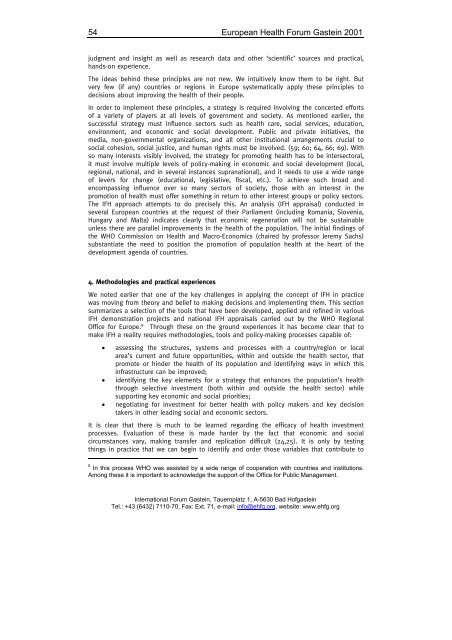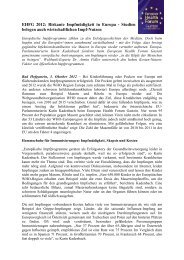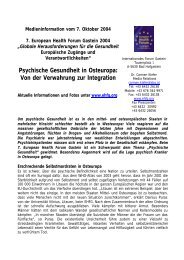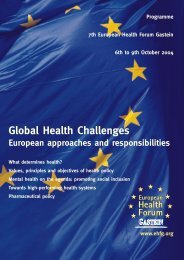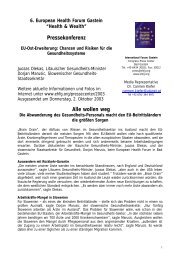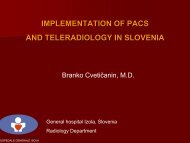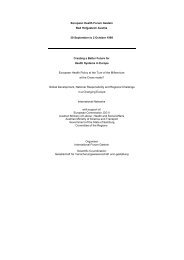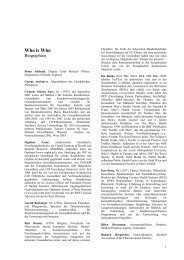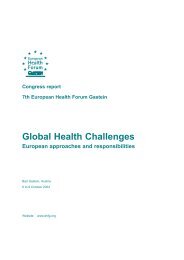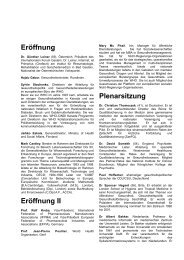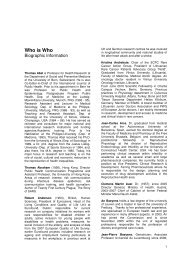Congress report - European Health Forum Gastein
Congress report - European Health Forum Gastein
Congress report - European Health Forum Gastein
You also want an ePaper? Increase the reach of your titles
YUMPU automatically turns print PDFs into web optimized ePapers that Google loves.
54<br />
<strong>European</strong> <strong>Health</strong> <strong>Forum</strong> <strong>Gastein</strong> 2001<br />
judgment and insight as well as research data and other ‘scientific’ sources and practical,<br />
hands-on experience.<br />
The ideas behind these principles are not new. We intuitively know them to be right. But<br />
very few (if any) countries or regions in Europe systematically apply these principles to<br />
decisions about improving the health of their people.<br />
In order to implement these principles, a strategy is required involving the concerted efforts<br />
of a variety of players at all levels of government and society. As mentioned earlier, the<br />
successful strategy must influence sectors such as health care, social services, education,<br />
environment, and economic and social development. Public and private initiatives, the<br />
media, non-governmental organizations, and all other institutional arrangements crucial to<br />
social cohesion, social justice, and human rights must be involved. (59; 60; 64, 66; 69). With<br />
so many interests visibly involved, the strategy for promoting health has to be intersectoral,<br />
it must involve multiple levels of policy-making in economic and social development (local,<br />
regional, national, and in several instances supranational), and it needs to use a wide range<br />
of levers for change (educational, legislative, fiscal, etc.). To achieve such broad and<br />
encompassing influence over so many sectors of society, those with an interest in the<br />
promotion of health must offer something in return to other interest groups or policy sectors.<br />
The IFH approach attempts to do precisely this. An analysis (IFH appraisal) conducted in<br />
several <strong>European</strong> countries at the request of their Parliament (including Romania, Slovenia,<br />
Hungary and Malta) indicates clearly that economic regeneration will not be sustainable<br />
unless there are parallel improvements in the health of the population. The initial findings of<br />
the WHO Commission on <strong>Health</strong> and Macro-Economics (chaired by professor Jeremy Sachs)<br />
substantiate the need to position the promotion of population health at the heart of the<br />
development agenda of countries.<br />
4. Methodologies and practical experiences<br />
We noted earlier that one of the key challenges in applying the concept of IFH in practice<br />
was moving from theory and belief to making decisions and implementing them. This section<br />
summarizes a selection of the tools that have been developed, applied and refined in various<br />
IFH demonstration projects and national IFH appraisals carried out by the WHO Regional<br />
Office for Europe. 9 Through these on the ground experiences it has become clear that to<br />
make IFH a reality requires methodologies, tools and policy-making processes capable of:<br />
• assessing the structures, systems and processes with a country/region or local<br />
area’s current and future opportunities, within and outside the health sector, that<br />
promote or hinder the health of its population and identifying ways in which this<br />
infrastructure can be improved;<br />
• identifying the key elements for a strategy that enhances the population’s health<br />
through selective investment (both within and outside the health sector) while<br />
supporting key economic and social priorities;<br />
• negotiating for investment for better health with policy makers and key decision<br />
takers in other leading social and economic sectors.<br />
It is clear that there is much to be learned regarding the efficacy of health investment<br />
processes. Evaluation of these is made harder by the fact that economic and social<br />
circumstances vary, making transfer and replication difficult (24,25). It is only by testing<br />
things in practice that we can begin to identify and order those variables that contribute to<br />
9 In this process WHO was assisted by a wide range of cooperation with countries and institutions.<br />
Among these it is important to acknowledge the support of the Office for Public Management.<br />
International <strong>Forum</strong> <strong>Gastein</strong>, Tauernplatz 1, A-5630 Bad Hofgastein<br />
Tel.: +43 (6432) 7110-70, Fax: Ext. 71, e-mail: info@ehfg.org, website: www.ehfg.org


